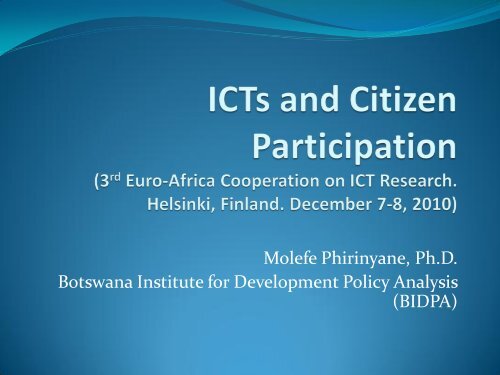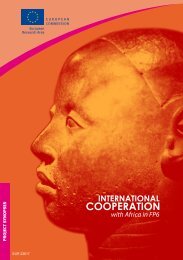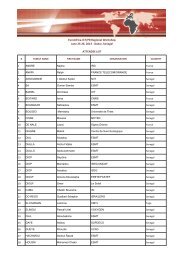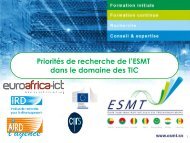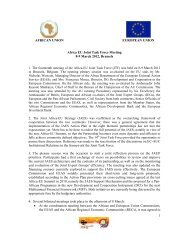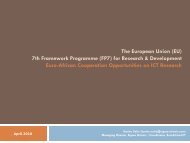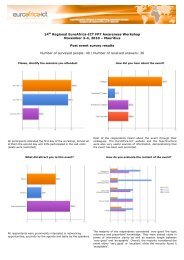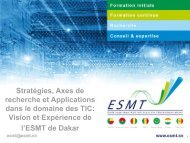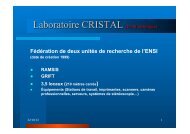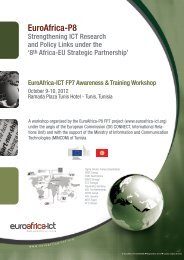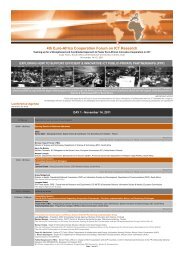Technology and the Nature of Active Citizenship - EuroAfrica-ICT
Technology and the Nature of Active Citizenship - EuroAfrica-ICT
Technology and the Nature of Active Citizenship - EuroAfrica-ICT
Create successful ePaper yourself
Turn your PDF publications into a flip-book with our unique Google optimized e-Paper software.
Molefe Phirinyane, Ph.D.<br />
Botswana Institute for Development Policy Analysis<br />
(BIDPA)
Introdution<br />
• Governance perspective – human development<br />
(MDGs).<br />
• Participation –activities <strong>of</strong> citizens <strong>and</strong>/or groups<br />
related to lobbying, voting, volunteering, dem<strong>and</strong> for<br />
services, etc.<br />
• <strong>Technology</strong> (Heeks, 2003):<br />
o Old – IT automating internal workings <strong>of</strong> government<br />
by processing data<br />
o New – <strong>ICT</strong>s supporting & transforming <strong>the</strong> external<br />
workings <strong>of</strong> government by processing &<br />
communicating data
Intro., cont.<br />
• Objective: to underst<strong>and</strong> <strong>the</strong> extent <strong>of</strong> <strong>the</strong> use <strong>of</strong> <strong>ICT</strong>s<br />
in citizen participation<br />
• Research Questions:<br />
a) What strategies are being adopted to stimulate<br />
access to communication technology (especially<br />
broadb<strong>and</strong> internet)?<br />
b) Why has citizens’ access to broadb<strong>and</strong> internet<br />
remained low?
Background to <strong>ICT</strong>s & Participation<br />
• Liberal democracy a non-participatory democracy<br />
o Contrast with A<strong>the</strong>nian ideal <strong>of</strong> democracy – participation in<br />
politics & decision making in <strong>the</strong> West passive (Marinetto,<br />
2003).<br />
o Minorities & o<strong>the</strong>r groups left out by traditional participation<br />
methods<br />
o Utopian attitudes towards <strong>ICT</strong>s (ibid). Broadb<strong>and</strong> internet a<br />
public good (Tapia & Ortiz, 2010).<br />
o Internet dominant utility in Western media (Quintelier &<br />
Vissers, 2008).<br />
o Versatility <strong>and</strong> ‘Interconnectedness’ <strong>of</strong> <strong>the</strong> internet<br />
(Chadwick & May, 2003)
<strong>ICT</strong>s in Developing Countries<br />
• World Bank influence (public sector reforms, SAPs)<br />
o<br />
‘Access to advanced information <strong>and</strong> communication technology<br />
(<strong>ICT</strong>) is a key factor in <strong>the</strong> economic <strong>and</strong> social development <strong>of</strong> Sub-<br />
Saharan Africa’ (Williams, 2010: 1).<br />
• Transfer <strong>of</strong> ideas from <strong>the</strong> West [donors, consultants, IT<br />
vendors, returning students, (Heeks, 2003)]<br />
• Expressed interest:<br />
We have high expectations <strong>of</strong> <strong>ICT</strong> <strong>and</strong> its transformative<br />
effects in all areas <strong>of</strong> <strong>the</strong> economy <strong>and</strong> society.<br />
Communications technology has fundamentally changed <strong>the</strong><br />
way people live, work, <strong>and</strong> interact socially, <strong>and</strong> we in Rw<strong>and</strong>a<br />
have no intention <strong>of</strong> being left behind or st<strong>and</strong>ing still as <strong>the</strong><br />
rest <strong>of</strong> <strong>the</strong> globe moves forward at an ever increasing pace<br />
(President Paul Kagame in Williams 2010: 1).
Conceptual background<br />
Building<br />
External<br />
Interactions<br />
Businesses<br />
O<strong>the</strong>r<br />
Agencies<br />
Improving<br />
Processes<br />
Government<br />
Communities<br />
Citizens<br />
[Customers]<br />
Connecting<br />
Citizens<br />
Government<br />
Source: Heeks (2003)<br />
Non-pr<strong>of</strong>its
Conceptual background, cont.<br />
• Improving Processes<br />
o Cutting process costs<br />
o Managing process performance<br />
o Strategic connections in government<br />
o Creating empowerment<br />
• Connecting Citizens<br />
o Talking to citizens<br />
o Listening to citizens<br />
o Improving public services
Conceptual background, cont.<br />
• Building External Interactions<br />
o Working better with business<br />
o Developing communities<br />
o Building partnerships<br />
• Problems with broadb<strong>and</strong> access:<br />
o Deepening digital divide – universal access (cognitive skills &<br />
literacy)<br />
o Physical location (urban/rural) – universal availability<br />
o Lack <strong>ICT</strong> skills in <strong>the</strong> labour market in dev. countries<br />
o High cost in developing countries<br />
o High failure rate <strong>of</strong> <strong>ICT</strong>s in Africa (see Chadwick & May, 2003;<br />
Heeks, 2003; Kim, 2008; Sylvester & McGlynn, 2010)
Analytical Framework & Research<br />
Methods<br />
• Analytical framework derived from Chadwick & May’s (2003) three<br />
models <strong>of</strong> interaction: managerial, consultative & participatory.<br />
• Managerial model:<br />
o ‘efficient’ delivery <strong>of</strong> government/state information to citizens <strong>and</strong><br />
o<strong>the</strong>r groups <strong>of</strong> ‘users’/information dissemination<br />
o improving flows <strong>of</strong> information within <strong>and</strong> around <strong>the</strong> state<br />
o ‘control’ as defining logic<br />
o importance <strong>of</strong> ‘service delivery’<br />
o speeding up <strong>of</strong> information provision is ‘opening up’ government<br />
o regulatory, law making; responding to <strong>the</strong> needs <strong>of</strong> <strong>the</strong> ‘new economy’<br />
o user resource issues (ability to receive <strong>and</strong> interpret information)<br />
largely absent<br />
o unilinear model <strong>of</strong> information
Analytical Framework & Research<br />
Methods<br />
• Consultative Model<br />
o polling, access <strong>of</strong> voters <strong>and</strong> o<strong>the</strong>r interested parties to<br />
government, representation <strong>of</strong> views,<br />
o advisory referendums<br />
o ‘push-button democracy’, ‘e-voting’ - direct democracy -<br />
instantaneous opinion polling<br />
o access as a technical issue - problems <strong>of</strong> self-selection <strong>of</strong><br />
citizen respondents<br />
o direct <strong>and</strong> unmediated contact between citizen <strong>and</strong> state<br />
o ‘electronic town meetings’<br />
o agenda framing as critical issue<br />
o technological lag among citizens <strong>and</strong> <strong>the</strong>ir representatives<br />
o unilinear model <strong>of</strong> information
Analytical Framework & Research<br />
Methods<br />
• Participatory model<br />
o civil society exists away from <strong>the</strong> state <strong>and</strong> (will be) mediated<br />
electronically<br />
o organic emergence <strong>of</strong> democracy<br />
o voluntary associations, spontaneous interactions within<br />
cyber-space<br />
o access is enough to encourage wider political participation<br />
o state protects free speech <strong>and</strong> rights <strong>of</strong> expression<br />
o participatory model will replace <strong>the</strong> o<strong>the</strong>r two through <strong>the</strong><br />
logic <strong>of</strong> information society<br />
o discursive model <strong>of</strong> information
Analytical Framework & Research<br />
Methods<br />
• Case Study Approach – Botswana (Interviews & desk<br />
research)<br />
• Why Botswana?<br />
o Advanced reformer (Adamolekun, 2005)<br />
o Rolled out <strong>ICT</strong>s to entire public sector<br />
o Middle income country<br />
o Stable democracy<br />
o No SAPs
Findings<br />
• <strong>ICT</strong> policy, infrastructure development <strong>and</strong> participation.<br />
• <strong>ICT</strong> policy, regulatory & institutional framework (strategy<br />
for <strong>ICT</strong>s)<br />
o Respondents considered <strong>the</strong> policy, regulatory & institutional<br />
framework as sufficient for <strong>the</strong> purpose<br />
o Queried <strong>the</strong> centralisation <strong>of</strong> <strong>the</strong> <strong>ICT</strong> management process<br />
within government<br />
o All government ministries, departments & LAs connected<br />
o Government web sites – service provision<br />
o Lack <strong>of</strong> funding – global economic recession<br />
o Nteletsa Project flagged as a success (telecentres, electricity –<br />
rural areas).<br />
o <strong>ICT</strong> education in <strong>the</strong> curriculum
Findings<br />
• Access to broadb<strong>and</strong> & participation<br />
o Decried exodus <strong>of</strong> trained experts to private sector<br />
o Limited b<strong>and</strong>width as shared with Zambia<br />
o High cost <strong>of</strong> broadb<strong>and</strong> internet (Botsnet)<br />
o People prefer DSTV & cellular phones over internet<br />
o Small market – large country makes service provision<br />
expensive
Conclusion<br />
• Botswana applies <strong>the</strong> managerial approach to <strong>ICT</strong>s.<br />
o Non-participatory<br />
o Communication unilinear<br />
• Centralisation <strong>and</strong> lack <strong>of</strong> capacity in <strong>the</strong> ministries<br />
hampers innovation<br />
• Limited financial resources a setback
Recommendations<br />
• Traditional & non-expensive participatory methods<br />
should be streng<strong>the</strong>ned<br />
• Govt must create incentives for online service<br />
transactions (e.g. discounts on online service levy<br />
payments, downloading <strong>of</strong> application forms)<br />
• Civil society organisations must be streng<strong>the</strong>ned<br />
(donors)<br />
• Developed countries reign down on multinationals to<br />
lower marine cable connection costs<br />
• Developed countries should create incentives for<br />
success – reward good performers


